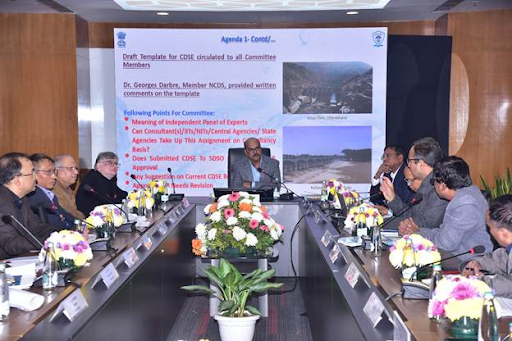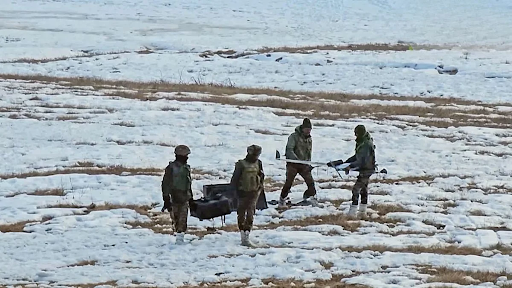




Source: VILLAGE SQUARE
Disclaimer: Copyright infringement not intended.
A New study featured in a Springer publication underscores importance of recognising Mahadev Koli tribe traditional knowledge systems as valuable scientific contributions to global climate adaptation strategies.
|
Aspect |
Details |
|
Community |
Mahadev Koli tribe an indigenous forest-dwelling community from Maharashtra primarily found in Akole block of Ahmednagar district part of North Western Ghats. |
|
Biodiversity Hotspot |
The tribe inhabits one of top 8 global biodiversity hotspots Western Ghats known for endemic flora & fauna. |
|
Study Conducted By |
Watershed Organisation Trust (WOTR) Centre for Resilience Studies, Pune |
|
Key Research Publication |
Featured in Springer book Mitigation & Adaptation Strategies Against Climate Change in Natural Systems |
|
Lead Researchers |
Dr. Y.D. Imran Khan, Saurabh Purohit & Omkar Hande |
|
Main Focus |
Documentation & validation of Local Ecological Knowledge (LEK) & Traditional Ecological Knowledge (TEK) possessed by tribe regarding medicinal plant use & climate variability detection. |
|
Medicinal Knowledge |
The Mahadev Kolis use 51 native tree species from 41 genera & 25 families for treating ailments like Fevers, Dysentery, Coughs, Joint pain, Skin infections, Snake bites |
|
Most Used Plant Parts |
Tree Bark – 24.8% Leaves – 23.1% Fruits – 20.5% |
|
Dominant Medicinal Families |
Fabaceae & Moraceae |
|
Skills in Climate Monitoring |
Community members can detect subtle ecological changes such as Alterations in plant cycles Availability of medicinal flora Shifting weather patterns |
|
Scientific Contribution |
TEK framed not as folklore but as adaptive, place-based, scientific knowledge vital for localised climate change response. |
|
Climate Dataset Value |
Offers real-time, ground-based climate observations not captured by conventional meteorological systems. |
|
Interdisciplinary Knowledge |
Tribal knowledge spans Plant taxonomy, Healing systems, Land-use patterns, Seasonal calendars, Spiritual significance of flora |
|
Policy Recommendation |
Inclusion of TEK in climate policy & disaster management strategies, Ethical collaborations between indigenous communities & scientists, Recognition of local taxonomies & environmental interpretations |
|
Broader Implications |
Highlights underrepresentation of tribal communities like Mahadev Kolis in climate discourse despite their critical knowledge base. |
|
Cultural Sensitivity Appeal |
Emphasises treating indigenous knowledge systems with respect, sensitivity & intellectual equity. |
|
Aspect |
Details |
|
Tribal Name |
Mahadev Koli (also spelled Mahadeo Koli) |
|
Classification |
Scheduled Tribe (ST) under Indian Constitution |
|
Region of Origin |
Primarily in Maharashtra & parts of Goa |
|
Key Districts |
Found mostly in Pune, Ahmednagar & Nasik districts |
|
Etymology |
Named after their deity Mahadev (Shiva) & Mahadev Hills their traditional homeland |
|
Language |
Speak Marathi |
|
Script Used |
Devanagari script |
|
Clans (Gotras) |
24 exogamous clans (intermarriage outside own clan); clan names used as surnames |
|
Famous Personality |
Tanaji Malusare – celebrated general in Chhatrapati Shivaji Maharaj's army; hero of Battle of Sinhagad |
|
Traditional Beliefs |
Predominantly Hindu traditions Each clan worships its own kuldevata (clan deity) Worship of Lord Mahadev (Shiva) is central |
|
Staple Food |
Rice Nagli (finger millet, Varai (barnyard millet), Wheat |
|
Primary Occupation |
Agriculture cultivating crops suited to hilly & semi-arid areas |
|
Subsidiary Occupations |
Cattle rearing Dairy & poultry farming Wage labour (in agriculture & construction) |
|
Medicinal Knowledge |
Possess Traditional Ecological Knowledge (TEK) Utilise over 50 native tree species for medicinal purposes Famous for use of bark, leaves & fruits from species in families like Fabaceae & Moraceae |
|
Ecological Skills |
Expertise in identifying subtle changes in climate & biodiversity Use of seasonal calendars, local taxonomy & forest-based indicators |
|
Cultural Identity |
Strong ties to folk traditions, oral storytelling, nature worship & ritual healing |
|
Settlement Type |
Typically live in forest-fringe villages & hilly terrains; semi-isolated settlements in Western Ghats |
|
Traditional Attire |
Men Dhoti, kurta, turban Women Lugade (sari), nose rings, silver ornaments |
|
Marriage Customs |
Strictly exogamous mostly endogamous within tribe; traditional marriages with clan rituals |
|
Festivals Celebrated |
Mahashivratri Pola, Gudhi Padwa, Diwali Local deity-specific fairs & jatra (temple festivals) |
|
Tribal Governance |
Informal tribal councils (panchs) to resolve disputes Important role for elders in conflict mediation |
|
Challenges Faced |
Marginalisation in mainstream policy-making Lack of access to quality education & healthcare Threats from deforestation & development projects |
|
Contemporary Status |
Increasing recognition in climate resilience research & heritage documentation; need for policy integration & scientific collaboration |
|
Aspect |
Mahadev Koli |
Katkari |
Warli |
|
Classification |
Scheduled Tribe (ST) |
Particularly Vulnerable Tribal Group (PVTG) |
Scheduled Tribe (ST) |
|
Region |
Maharashtra (Pune, Nasik, Ahmednagar), Goa |
Raigad, Thane, Palghar, Pune |
Palghar, Thane, Dahanu |
|
Language |
Marathi |
Katkari dialect (Marathi influence) |
Varli (Marathi-Konkani mix) |
|
Script Used |
Devanagari |
Devanagari |
Devanagari |
|
Clans |
24 exogamous clans |
Clans not rigid; community-based roles |
Matrilineal clans with totems |
|
Religious Beliefs |
Hinduism; clan deities; worship Mahadev |
Animism, ancestor worship, Hindu influence |
Worship of Nature, Mother Earth & spirits |
|
Staple Food |
Rice, nagli, varai, wheat |
Rice, roots, tubers, wild fruits |
Rice, fish, local vegetables |
|
Traditional Occupation |
Agriculture, dairy, medicinal plant use |
Charcoal making, forest labour, fishing |
Subsistence farming, forest work, mural painting |
|
Famous For |
Tanaji Malusare; forest-based climate knowledge |
Extremely poor socio-economic indicators; forest workers |
Warli Art tribal wall painting tradition |
|
Medicinal Knowledge |
High – 50+ native tree species used |
Limited documented TEK |
Some knowledge of wild herbs & healing rituals |
|
Art & Culture |
Oral traditions, deity worship, Shivaji-era folklore |
Folk songs, dance during fairs |
Warli paintings, wedding rituals, musical instruments |
|
Marriage Customs |
Exogamous within tribe; clan-based rituals |
Early marriages; symbolic exchanges |
Wedding murals, rice rituals, traditional music |
|
Festivals Celebrated |
Mahashivratri, Diwali, Gudhi Padwa |
Local jatras, Holi, Diwali |
Holi, Diwali, Tarpa festival |
|
Tribal Governance |
Traditional Panchs & elders |
Community gatherings for decisions |
Elders & ritual leaders (Bhagat) |
|
Settlement Type |
Forest-fringe villages in Ghats |
Forest hamlets; migratory pattern |
Hilly, coastal settlements |
|
Key Challenges |
Recognition of TEK, climate inclusion |
Poverty, malnutrition, bonded labour history |
Cultural commodification of art, forest loss |
|
Current Status |
Featured in climate research (Springer, 2025) |
Listed under PVTG; vulnerable to displacement |
Warli art gaining global recognition; eco-tourism interest |
For more information, please refer to IAS GYAN
Sources: INDIAN EXPRESS
|
PRACTICE QUESTION Q.Traditional ecological knowledge of indigenous communities like Mahadev Koli plays a vital role in cultural sustainability. Discuss with examples. |





© 2026 iasgyan. All right reserved